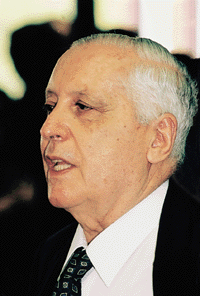Institutes Internationaux de Physique et de Chimie
fonde’s par E.Solvay A.S.B.L.
50, Av. F.D. Roosevelt B-1050 Bruxelles
Directeur: Professeur I. Prigogine
Prof. Dr.
Ilya Prigogine
In a recommendation forPeter Hübner‘s activity he states:
“The influence of music on the brain – and from there on the entire human physiology, mind and psyche – seems to me to be one of the most important research fields of today, since medicine and education are both in urgent need of being able to create harmony in a person in an objective, scientific way.
Therefore I find the efforts of the classical composer and musicologist Peter Hübner – who follows the scientific, mathematical approach practiced by Pythagoras and followed on by Johannes Kepler – most interesting and worthwhile to be promoted from as many sides as possible.
Mr. Hübner’s impressive musicological and artistic work often reminds me - as a scientist and as a lover and player of classical music - of Gottfried Wilhelm Leibniz’s vision:
‘I foresee
that the study of mathematics
will be directed
at grasping harmony and beauty
in their essence.’
